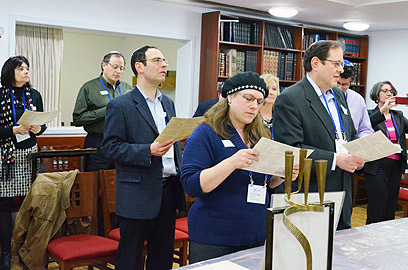Op-ed: Overseas, the prime minister voices his support for all Jewish denominations; in Israel, he appoints a chief rabbi who criticizes the education minister for visiting a US Conservative community.
Israel’s Chief Rabbi David Lau criticized Education Minister Naftali Bennett recently for visiting a Conservative community in the United States. “This conduct is unacceptable to the Jewish people,” the rabbi said of Bennett’s visit, adding that “speaking to a marked audience and recognizing it and its path, when this path pushes the Jews away from Israel’s path is forbidden
“Had Minister Bennett asked for my opinion before the visit, I would have told him explicitly that ‘you can’t go to a place where education pushes Jews away from tradition, from the past and from the future of the Jewish people.'”
About a month ago, Prime Minister Benjamin Netanyahu spoke in the US and expressed his support for all denominations of Judaism. “As prime minister of Israel, I will always ensure that all Jews can feel at home in Israel — Reform Jews, Conservative Jews, Orthodox Jews,” Netanyahu said, adding that for the first time the Israeli government, together with the Jewish Agency, would invest in and bolster the Reform and Conservative communities within the State of Israel.
I don’t understand why the Conservative community in Israel was so excited by the prime minister’s ardent speech. After all, they know that Netanyahu phrases his doctrine according to the audience and for survival purposes.

About two weeks ago, I called on the prime minister at the Knesset to say the same things in the plenum hall, so that lawmakers from his coalition would be able to hear them too, and – as important – to implement what he promised. Needless to say, that did not happen.
More than two years ago, the State of Israel chose two chief rabbis. At the time, I fought with all my might for at least one Zionist rabbi to head the Chief Rabbinate (in addition to the attempt to cancel the duplicity of the position). Netanyahu made a significant contribution to Zionism’s humiliating loss in this race (as did the Bayit Yehudi party). The prime minister supported the election of Rabbi Lau’s election openly and behind the scenes and Bennett, who served as minister of religious affairs at the time, dragged his feet and allowed the ultra-Orthodox to appoint two rabbis.
Unlike Rabbi Lau, I welcome Minister Bennett’s visit to the Conservative community in the US. The Prime Minister’s Office, meanwhile, is keeping silent, offering no backing for Bennett and no support for the Conservatives.
In front of a diverse audience of US Jews, Netanyahu told them what they wanted to hear, expressing support for the different Jewish religious movements and promising to care for them. And in Israel? Netanyahu falls into line with his “natural partners.”
I’m finding it difficult to understand which prime minister I should believe: The one who expresses his support for all Jewish denominations while overseas, or the one who appoints a chief rabbi for the State of Israel who criticizes the education minister for visiting a Conservative community in the US? Netanyahu who makes speeches in the US or Netanyahu who does nothing in Israel?
The religious parties’ total disregard for the Reform and Conservative streams has seriously damaged Israel’s relations with the Diaspora and contributed to assimilation in the US.
Several weeks ago, when I met members of the American Jewish Committee from all denominations, even the Orthodox ones among them wanted to see the prime minister’s comments as good news, as if something was about to change. I calmed them down and explained that they should not get their hopes up. The prime minister matches his statements to his audience and political interests, and his main consideration is his survival. I suggested that they should not expect him to say a word about it when he returns to Israel. For now, I was right.
All that is left for us to do is to decide who to believe – the first Netanyahu or the second Netanyahu?
As reported by Ynetnews
